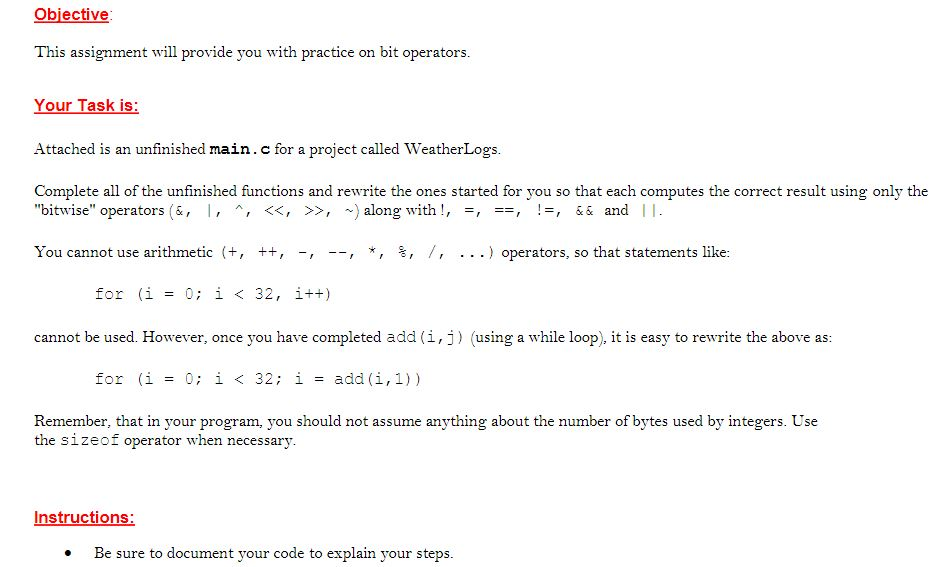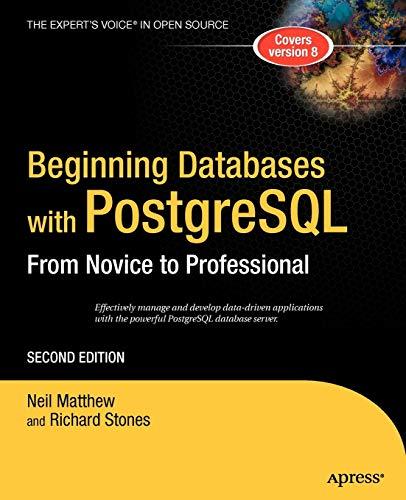Question
Please finish the following project using C language with the following requirement. Here is the unfinished project code. Please finish this based on the code
Please finish the following project using C language with the following requirement.
Here is the unfinished project code. Please finish this based on the code and requirment above. Do not just send back the code.
#include
/* weatherlog_t is a "weather sensor log type" which is really defined as a 64-bit unsigned integer. See below. */ typedef uint64_t weatherlog_t;
unsigned int add(unsigned int, unsigned int); unsigned int sub(unsigned int, unsigned int); unsigned int mul(unsigned int, unsigned int);
void print_half_nybbles(unsigned int); unsigned int reverse_half_nybbles(unsigned int);
int has_odd(unsigned int); unsigned int make_odd(unsigned int);
int is_negative(int);
weatherlog_t pack_log_entry(unsigned int, unsigned int, unsigned int, unsigned int, int, int, unsigned int, unsigned int);
unsigned int get_year(weatherlog_t entry); unsigned int get_month(weatherlog_t entry); unsigned int get_day(weatherlog_t entry); unsigned int get_zip(weatherlog_t entry); unsigned int get_high(weatherlog_t entry); unsigned int get_low(weatherlog_t entry); unsigned int get_precip(weatherlog_t entry); unsigned int get_wind(weatherlog_t entry);
int main(int argc, char **argv) { unsigned int i, j; int x, y; unsigned int year, month, day, zip, high_temp, low_temp, precip, avg_wind_speed; weatherlog_t log_entry; printf("Enter an integer: "); scanf("%u", &i); printf("Enter another integer: "); scanf("%u", &j); printf("One more integer, please: "); scanf("%d", &x); printf("Please enter a positive integer: "); scanf("%d", &y); printf("i + j = %u ", add(i,j)); printf("i - j = %u ", sub(i,j)); printf("i * j = %u ", mul(i,j)); if (is_negative(x)) printf("%d is negative ", x); else printf("%d is non-negative ", x); if (has_odd(y)) { printf("%x has an odd number of bits in its binary representation ", y); } else { printf("%x has an even number of bits in its binary representation ", y); printf("but %x has an odd number of bits in its binary representation ", make_odd(y)); } printf("The half-nybbles of %d (in hex 0x%x) are:", x, x); print_half_nybbles(x); printf("%x with reversed half-nybbles is %x ", x, reverse_half_nybbles(x)); printf("Enter a year: "); scanf("%u", &year); printf("Enter a month as an integer (1-12): "); scanf("%u", &month); printf("Enter a day as an integer (1-31): "); scanf("%u", &day); printf("Enter a zip code as an integer (0-99999): "); scanf("%u", &zip); printf("Enter a temperature as an integer: "); scanf("%u", &high_temp); printf("Enter another temperature as an integer: "); scanf("%u", &low_temp); printf("Enter rainfall amount as an integer (mm): "); scanf("%u", &precip); printf("Enter a as an integer (km/hr): "); scanf("%u", &avg_wind_speed); log_entry=pack_log_entry(year, month, day, zip, high_temp, low_temp, precip, avg_wind_speed); printf("You entered: %u/%u/%u for zip %5d: high %d F, low %d F, precip %d mm, wind speed %d km/hr ", get_day(log_entry), get_month(log_entry), get_year(log_entry), get_zip(log_entry), get_high(log_entry), get_low(log_entry), get_precip(log_entry), get_wind(log_entry)); return 0; }
unsigned int add(unsigned int i, unsigned int j) { /* can be done in a total of 7 lines, including one to declare an unsigned int, */ /* two for a while loop, and one for the return You're not required to do it in 7 lines though . */ return i + j; }
unsigned int sub(unsigned int i, unsigned int j) { /* Similar 7 lines, although there is a shorter way */ return i - j; }
unsigned int mul(unsigned int i, unsigned int j) { /* can be done in a total of 8 lines including one to declare unsigned ints */ /* two for a for loop, and one for the return */ return i * j; }
/* prints the half-nybbles (i.e. 2 bit values) of x, one half-nybble at a time */ void print_half_nybbles(unsigned int x) { }
/* returns the reverse of the half-nybbles of i */ unsigned int reverse_half_nybbles(unsigned int i) { return 0u; }
/* returns 1 if x
Do not use the operators. */ int is_negative(int x) { return 0; }
/* returns 1 if x's binary representation has an odd number of 1s or 0 otherwise */ int has_odd(unsigned int x) { return 0; }
/* If x's binary representation contains an odd number of 1s, x is returned. Otherwise, it returns a copy of x, but with its most significant bit modified so that there is an odd number of 1s. */ unsigned int make_odd(unsigned int x) { return 0; }
/* combines all of the arguments into a single weatherlog_t entry as described below */ weatherlog_t pack_log_entry(unsigned int year, unsigned int month, unsigned int day, unsigned int zip, int high_temp, int low_temp, unsigned int precip, unsigned int avg_wind_speed) { return 0; }
unsigned int get_year(weatherlog_t entry) { return 0; }
unsigned int get_month(weatherlog_t entry) { return 0; }
unsigned int get_day(weatherlog_t entry) { return 0; }
unsigned int get_zip(weatherlog_t entry) { return 0; }
unsigned int get_high(weatherlog_t entry){ return 0; }
unsigned int get_low(weatherlog_t entry) { return 0; }
unsigned int get_precip(weatherlog_t entry) { return 0; }
unsigned int get_wind(weatherlog_t entry) { return 0; } Show transcribed image text
Objective This assignment will provide you with practice on bit operators Your Task is: dninisheain efor proet siled Weatherl.ogs Complete all of the unfinished functions and rewrite the ones started for you so that each computes the correct result using only the "bitwise" operators (&, I, *, >,along with!, ,,-, && and II You cannot use arithmetic (+, ++, *, %, /, ) operators, so that statements like -, --, for (i=0; iStep by Step Solution
There are 3 Steps involved in it
Step: 1

Get Instant Access to Expert-Tailored Solutions
See step-by-step solutions with expert insights and AI powered tools for academic success
Step: 2

Step: 3

Ace Your Homework with AI
Get the answers you need in no time with our AI-driven, step-by-step assistance
Get Started


